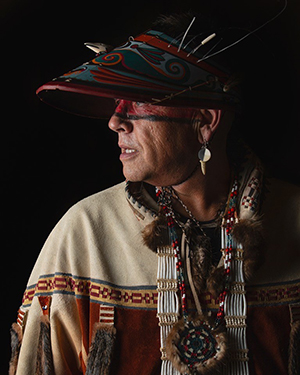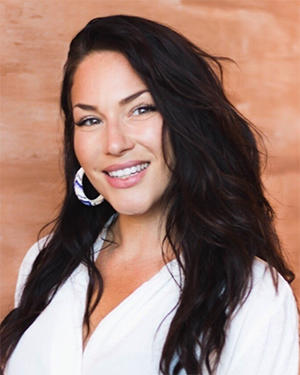Sealaska Heritage Institute (SHI) has enlisted renowned, nationally-known educators to give keynote addresses at its fourth education conference for teachers and administrators in Southeast Alaska, which is part of a larger effort to promote culturally responsive pedagogy in schools.
 Dr. Tiffany Lee, Ph.D.
Dr. Tiffany Lee, Ph.D.
Tiffany S. Lee (Diné/Oglala Lakota) is a professor and chair of Native American Studies at the University of New Mexico. Her research examines educational and culturally-based outcomes of Indigenous language immersion schools, Native youth perspectives on language reclamation, and socio-culturally centered education. Her work is published in journals, such as the Journal of Language, Identity, and Education and the Journal of American Indian Education; and in books, such as Diné Perspectives: Revitalizing and reclaiming Navajo thought. She is a former secondary social studies and language arts teacher, and a former member of the New Mexico Indian Education Advisory Council, Public Education Department. She is currently involved with colleagues on projects to open a Diné language nest in Albuquerque and to prepare Diné speakers to become Diné language immersion educators.

Ethan Petticrew
Ethan Petticrew has worked all over the state of Alaska as a teacher, administrator, and curriculum coordinator. He was born in Wrangell, Alaska. Ethan’s Tlingit name is Daayoosh. Although he is Unangax by blood, he is also an original Sealaska shareholder, and belongs to the Kiks.ádi from Gagaan Hít. His experiences and education have given him a unique perspective into what makes the field of teaching such an important one, especially in a state as diverse as Alaska.
Petticrew is very proud of his Unangax heritage and works to make sure that all students’ cultures are recognized in the classroom. When asked about why he became a teacher, he declared, “we should not feel ashamed for who we are or how our parents have dressed us. Our lifestyle, our language, our culture — anything that we do, we should not have to feel shame for that. [Realizing] that, that’s when I decided to become a teacher.” It is Petticrew’s desire that every child, regardless of their background, receive an appropriate and positive education without fearing that they will be looked down upon or mistreated because of their heritage.
Debates surrounding the ideas of the westernization of education in Alaska and maintaining Native traditions have ignited the political and education landscape for more than 50 years. Petticrew sees a future where “our children should be able to walk in both worlds and do equally well in both of them.” He goes on to say, “I think that we as a country, as a state, as communities, as school districts seriously need to look at how we’re educating children and we must change. We cannot continue doing the same thing.” According to Petticrew, the only way progress will be made is by doing what is in the best interest of every child without exception.
At the end of the day, “...it’s gotta come from us. We have to change this,” Petticrew says. By encouraging more Alaskan students to go into the field of education, he firmly believes that an increase in traditional knowledge and a respect for cultural values will be reflected. “If we’re going to have any success as a people…then education is a big part of it.” His strive for success in education, both locally and globally, is a quality to which professionals in all fields should aspire.
Petticrew is a retired educator with more than 21 years in the classroom. He has also served as a curriculum coordinator for Aleutian Region School District and as the vice president for Cultural and Educational Services at the Alaska Native Heritage Center. Currently he is the executive director for Cook Inlet Native Head Start. He received a bachelor’s degree in elementary education from the University of Alaska, Southeast. Later he earned a master’s of arts degree in education for curriculum and instruction from Ball State University. In the future, Petticrew would eventually like to pursue his Ph.D. in Indigenous pedagogy.
 Nikki Sanchez
Nikki Sanchez
Nikki Sanchez (she/her) is a Pipil/Maya and Irish/Scottish academic, Indigenous media maker and environmental educator. Nikki holds a master's degree in Indigenous governance and is presently completing a Ph.D. with a research focus on emerging visual media technology as it
relates to Indigenous ontology.
Nikki is a board member of the Sierra Club BC, BC Women’s Hospital, and a doctoral fellow at the Center for Religion and Society at the University of Victoria. She designed and directed the first-ever "Indigenous Storyteller" edition with Telus STORYHIVE, a project to provide funding and mentorship for 30 emerging Indigenous filmmakers in BC and Alberta.
Nikki is the author of Spirits of the Coast, the bestselling anthology of the Salish Sea Resident Orca published by Royal BC Museum. Nikki had the honour of working for the David Suzuki Foundation as their, "Queen of Green" (queenofgreen.ca), where her work centered on environmental journalism, social media and digital media creation to provide sustainable solutions for a healthy planet, as well as content creation, to bring more racial and gender inclusivity into the environmental movement.
As an Indigenous media maker, Nikki's most recent project is the 8-part documentary VICELAND series “RISE” focused on global Indigenous resurgence. RISE debuted at Sundance in February 2017 and has received global critical acclaim, recently winning "best documentary" at the Canadian Screen Awards. Nikki is a TEDx speaker, and her recent presentation is entitled “Decolonization is for Everyone”. She has been a wilderness guide and environmental educator in the Nuu-chah-nulth territory of Clayoquot Sound for over 10 years, where she was mentored by Nuu-chah-nulth elders Tsahsiits and Qaamina Sam. She is the creator and director of Decolonize Together, a collective of Indigenous women who offer decolonial and inclusivity workshops and curriculum creation. Decolonize Together has been teaching and facilitating decolonization and anti-oppression training for universities, school boards, corporations, and NGOs for the past five years. Nikki also writes about Indigenous, environmental and social justice issues; her writing has been published in Last Real Indians, Loose Lips Magazine, Intercontinental Cry and The Hundreds.
 Dr. Candace Galla, Ph.D.
Dr. Candace Galla, Ph.D.
Dr. Candace Galla attended the University of Arizona on the original homelands of the Tohono O’odham and Pascua Yaqui nations where she received a B.A. in Linguistics, an M.A. in Native American Linguistics and a Ph.D. in Language, Reading, and Culture. Dr. Galla is an associate professor at the University of British Columbia Vancouver and teaches on the traditional, ancestral, and unceded territory of the hən̓q̓əmin̓əm̓ speaking Musqueam people. She is a well-known presenter who has extensive experience providing keynote presentations to a wide variety of audiences and has provided workshop presentations for educators.
